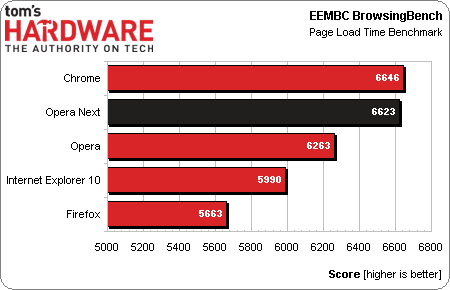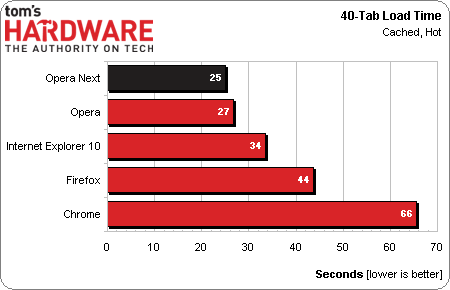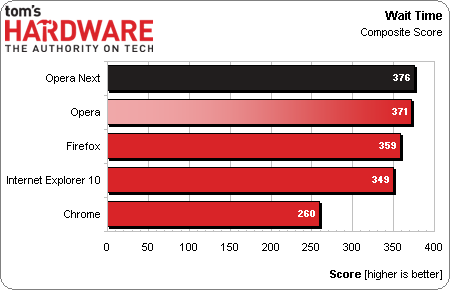Chrome 27, Firefox 22, IE10, And Opera Next, Benchmarked
Today, we have the latest benchmark results from the top four Windows-based Web browsers, along with a sneak peek at Opera's upcoming Chromium-based overhaul. Is this really a step-up from Presto/Carakan or just another Chrome clone?
Wait Times: Page Load
Why you can trust Tom's Hardware
Moving on to page load time, we have EEMBC's BrowsingBench. This is one of the more real-world benchmarks in that it uses actual sample Web pages instead of test pages created for the purposes of benchmarking. Like our previous page load timer, BrowsingBench is run from our local Web server. Unlike our previous solution, though, BrowsingBench runs multiple iterations in each session, uses several different pages from the same site, and also tests foreign and mobile pages.
Chrome takes the lead in BrowsingBench, though predictably, Opera Next is right on Google's heels in second place. Switching to a non-Chromium browser, the original Opera is in third, just 400 points behind the leaders. IE10 is another 300 points behind in fourth place, with start-up champ Mozilla Firefox earning last place at nearly 1000 points behind the leaders.
As series regulars know, we load the top 40 Web pages in a single browser window in our memory efficiency and page load reliability testing. Some of you asked us to time this massive workload, so we did. Just like those two tests, all 40 tabs are pre-loaded so that the contents are in cache, and the browsers are started up (hot) before the command to open the 40 tabs is given. Times are taken using a stopwatch and timing begins from the point that the 40 bookmarks are opened to the point that all tabs stop loading.
And we have a winner, folks! It's Opera. Both of them. Opera Next takes an average of only 25 seconds to open the 40-tab workload, while the current version takes just 27 seconds. Internet Explorer 10 takes almost 35 seconds, though there's a caveat. IE still crashes when loading this number of tabs for the first time (uncached/cold) and takes several minutes to recover. Although we're not testing the uncached/cold scenario, none of the other browsers fall to pieces during the setup process for these tests.
Firefox 22 places fourth around the 45-second mark, while Chrome takes more than a minute to finish loading. We need to keep the reliability ratings in mind too, though. Although Firefox comes in behind IE10, Mozilla typically enjoys an edge in properly rendering all 40 of these pages, whereas Redmond's browser has earned some of the worst reliability ratings we've recorded over the years. What's amazing, however, is that Opera traditionally rivals Firefox in proper page loads, yet does so even faster than the less reliable browsers. Later on, we'll see if Opera Next loses or retains this uncanny mix of speed and correctness.
Wait Time Composite
With the wait time composite, we have our first category winner: Opera! While Opera Next earns the best composite score, as we have to keep reminding ourselves, it's still in development and ineligible for the win. As far as the current championship is concerned, the victory goes to the runner-up. Luckily for the folks at Opera, that still makes Opera the winner. Yes, folks, the current version of Opera offers the shortest wait times out of the top four Windows browsers. Firefox and IE10 take very close second- and third-place finishes. Meanwhile, despite rendering most single webpages faster than the competition, Chrome's slowing start-up times and the new heavy workload place the browser quite a bit further behind.
Current page: Wait Times: Page Load
Prev Page Wait Times: Start-Up Next Page JavaScript And DOM PerformanceGet Tom's Hardware's best news and in-depth reviews, straight to your inbox.
-
Onus No, the Onus is not on Google; I'm using www.startpage.com for my searches.Reply
While this is interesting, I still encounter built-in pages (such as on routers or other network devices) that will not render cleanly in Firefox, but are perfect in IE. More often than not though, pages that would be filled with nuisance ads and popups are cleaned up nicely by Firefox with AdBlock+ and NoScript.
-
soundping A good test is rendering a heavy site like Huffington Post. They use a ton of flash and java scripts.Reply -
ivyanev While benchmarks are the way to compare browsers, they do not represent the feel you get- firefox might be faster but still feels sluggish compared to chrome or opera(the stable one).Reply -
pharoahhalfdead I would like to see benchmarks on page start up, and load times comparing ssd, hard drives, and ram drives. Maybe I missed these an a previous article, but I feel since ssd's and ram drives are getting more popular, benchmarks should prove or dispel the the 'so called' benefits they bring.Reply
I have both and start up times for IE are quick but page load times are horrendously slow, whereas FF has slow start up times but superfast page load times. It's possible that add-ons are contributing to that. -
mccainm Ever since I have compared Firefox and Chrome I've always found Chrome to start much faster (I'm running the Dev channel and my wife uses the Stable channel and they both take maybe 1 - 2 seconds to start cold or hot). Only IE beats both of them. Maybe Firefox 22 is that much faster and worth a try, but seeing as Chrome did so well in most categories I'll probably stick with it.Reply -
EzioAs Having move back to Firefox a couple years ago after Chrome, I don't intend to use Chrome (or any other browser) regularly anymore. I still give Chrome 2-3 tries a week (just to compare things) but Chrome isn't better than FF in 3 things:Reply
1) Pages load noticeably slower
2) Memory usage is indeed high (as seen in the benchmark above)
3) FF add-ons are much better than chrome extensions.
I never noticed any startup time difference for both FF and Chrome; it's possible they're both fast enough that it doesn't even matter at this point. I also like the FF toolbars better although that's really more of a personal preference. I've never tried maxthon though; heard it's pretty good. -
beoza I've never really noticed a difference in browsers speed wise. Sure some load pages faster than others, and some have issues with certain pages. But in the end they all take me to the same place. I use Firefox 95% of the time at home with adblock+, if I encounter an issue I clear cache, if it still has issues I switch to IE 10, usually this is all I need to do but once in a while IE has problems with a page and I just move on to something else. At work I'm stuck using IE10. The speed of a browser can also be affected by other factors like the speed of your connection, how many devices are on your network, what tasks your doing on the computer at the same time like gaming, downloading, streaming movies (netflix, hulu), and your hardware. You're not going to get much responsiveness on a 5yr old celeron w/2gb ram and Win XP while you're downloading a game, watching youtube and the A/V suite scans your computer in the background, and there's 5 other people all sharing your 10Mbps network. Which describes probably 50% of the users out there in the real world.Reply -
Someone Somewhere Opera Next (and every other browser) is a significant step down in terms of features/customization from the current version.Reply
I'll miss a hell of a lot of stuff when I move off Presto-based Opera. -
ElDani Well done on this test, I actually found the test results genuinely helpful and your summary/conclusion to be well thought out.Reply
Still, this test shows us once more, that no modern browser - I exclude Opera from this, since it isn't a maintained release anymore - must absolutely be replaced by the winner of such tests. If you don't mind performance weaknesses of the Internet Explorer in certain areas, or if your most-accessed websites don't require you to use a certain alternative, then even Microsoft's browser of choice can be okay for daily use (if only as an engine in products like Avant, Maxthon, etc).
The one thing I'm a bit curious about: why does Opera Next suddenly behave so differently from Chrome? Yes, there's a difference between Chrome 27 (WebKit) and Opera Next (Blink = Chrome 28), but if that's the only reason for the browser's weaker showing, then the future of Chrome doesn't look too good. What's your take on this? -
tomfreak I dont know how useful in this review when they are tested all the browser on a 1155 super computer, nobody is going to tell the diff if the browser is 0.25sec faster. Get some Brazos, Atom and run the test, these are the platform have problems with web browsing.Reply


